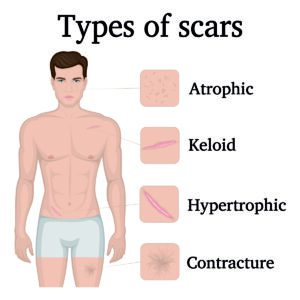
Scars form as your body works to heal itself, repairing damaged skin by building tissue to close the gap. That scar tissue is mainly made of the protein collagen and works to pull the skin together and fill in the wound. Any time the skin is harmed, a scar forms in the affected tissues, such as after an accident, burn, surgery, skin condition or illness. However, scars come in many shapes and sizes, some more visible and unsightly than others.
Dr. Arie Benchetrit offers laser scar resurfacing to improve the texture and tone of your scar tissue for a more even complexion.
Types of Scars
People with dark skin or red hair tend to be more prone to keloid scars, which happen when the scar tissue raises and grows beyond the border of the injured area. Contracture scars may occur after a burn injury and cause the skin to tighten, making movement difficult if the scar tissue reaches into the muscle, nerves or sits over a joint.
Depressed or atrophic scars are linked to acne and chickenpox and appear sunken, whereas raised or hypertrophic scars are elevated tissues you can feel when your finger runs over the skin. Flat scars may be red or pink or slightly different from surrounding tissue, and stretch marks are specific scars that appear when the skin shrinks or expands quickly.
The proper scar treatment depends on the type of scar, its size and location, and if it causes pain or stiffness.
Laser Scar Resurfacing in West Island
Laser scar revision takes less than an hour with local anesthesia and is an outpatient procedure. Dr. Benchetrit uses the advanced Erbium-Yag laser, which works to replace damaged scar tissue with new, healthy skin. The handpiece is placed over the scar and emits a controlled beam of energy that goes deep into the skin’s tissues reaching a precise depth for skin remodeling. The laser energy coagulates the scar and triggers new collagen for fresh, smooth skin. A whole week of downtime is required after laser scar resurfacing because the area is red and swollen and must be kept moist for optimal healing.
This laser treatment can improve a variety of scars, including those from acne or old injuries, hypertrophic scars, keloid scars and contracture scars and also improves facial wrinkles around the mouth, cheeks, forehead and eyes.
Dr. Benchetrit is one of few Canadian surgeons who use the Vectra 3D photography system to simulate your results on a computer screen using 3D photos of your face to preview your final results.
If you’re interested in laser scar resurfacing, contact Dr. Benchetrit in West Island, Montreal, for a free consultation. Call (514) 700-5189 to schedule your appointment or fill out our online contact form.
















